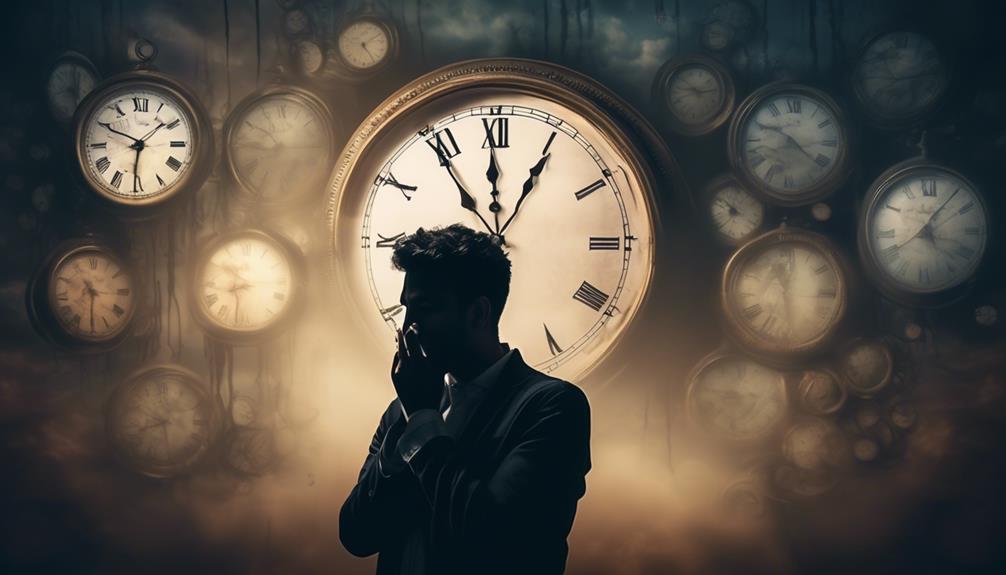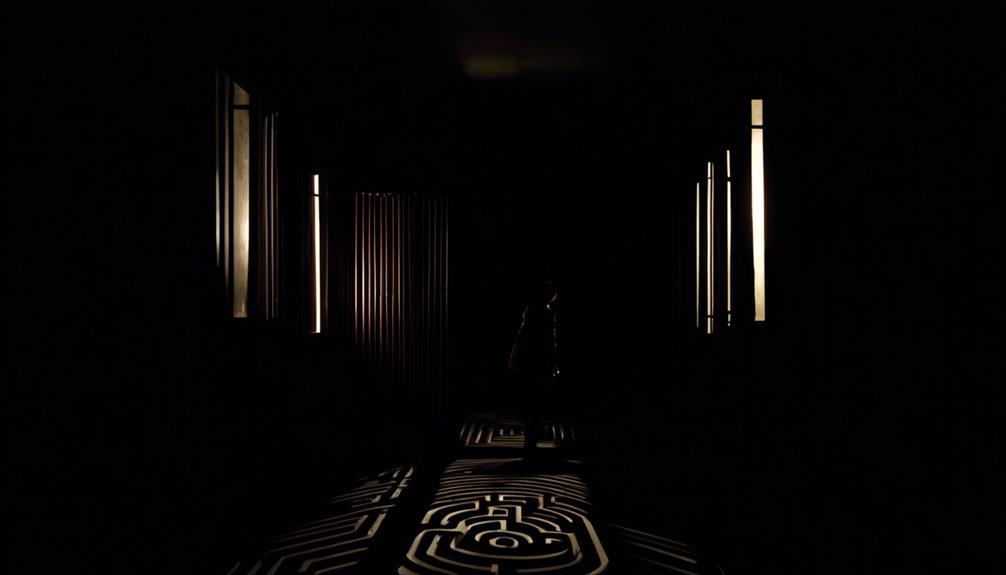While you might think that your dreams are a unique tapestry of your personal psyche, you’d be surprised to learn how many of your nighttime narratives are shared by countless others as some of the most common dreams. You’ve probably been chased through an endless corridor, struggled to scream without a voice, or found yourself embarrassingly unclad in public. These motifs are not as random as you’d think; they’re universal stories, playing out in the minds of people across the globe.
As you navigate your waking life, you carry with you the echoes of these dreams, subtly influencing your emotions and reactions. Beyond mere curiosity, understanding these visions can offer valuable insights into your subconscious motivations and unresolved issues.
So, what are these most common dreams trying to tell you, and why do they seem to choose you as their audience? Stay with this journey into the nocturnal theater of the mind, and you just might unlock some of the secrets behind your most puzzling dreamscapes.
Understanding Dream Interpretations
Delving into dream interpretations can unlock a deeper understanding of your subconscious, offering valuable insights into your emotional landscape and unresolved conflicts. When you seek to comprehend the dream meanings behind the narratives played out in your sleep, you’re engaging with a tradition that spans across cultures and time.
Experts agree that while some dreams have universal themes, the deeper meanings are often personalized, reflecting your unique experiences and feelings.
Understanding dream interpretations require a nuanced approach. A certified dream analyst may interpret recurring dreams as indicators of persistent issues needing attention. For instance, dreams of falling could signify a sense of losing control in your waking life, while being chased might symbolize avoidance of a pressing matter.
Moreover, nightmares are frequently linked to distressing experiences or unprocessed emotions. Analyzing these discomforting dreams can reveal underlying concerns, allowing you to confront and resolve them consciously. By recognizing patterns and emotional triggers within your dreams, you can gain clarity on your internal struggles, potentially leading to cathartic breakthroughs and emotional healing.
Thus, the study of dreams isn’t just a curiosity but a window into the psyche, providing valuable tools for introspection and personal growth.
Falling Endlessly

While analyzing the symbols in your dreams can unearth insights into your emotional state, the recurring theme of falling endlessly often points to deeper issues of control and stability in your waking life. The sensation of falling in a dream, which can jerk you out of sleep, is a primal fear that manifests in your subconscious. If you’re experiencing dreams about being chased or losing your teeth, these scenarios can amplify the feeling of falling, weaving a narrative of anxiety and pursuit.
Scholars suggest that a dream of falling may reflect feelings of insecurity or a loss of support in your personal or professional life. The emotional response to this dream is telling; a sense of dread or panic accompanies the fall, symbolizing a fear of letting go or a reluctance to face an inevitable situation. Analyzing such dreams requires an understanding of the context within the dream and your current life circumstances.
The feeling of falling, especially without end, could indicate an ongoing struggle with surrendering control or acknowledging vulnerability. It’s essential to consider the aspects of your life that feel unstable or out of balance. Reflecting on these dreams can reveal your subconscious coping mechanisms and the need to address underlying tensions or uncertainties.
Being Chased

If you’ve ever found yourself sprinting through a twisted maze of your own nightmares, being chased by an unseen force, this dream scenario may highlight your subconscious attempts to evade a pressing issue or emotion in your waking life. Dreams of being chased are among the most common dreams reported, and dream experts suggest they symbolize a variety of fears and anxieties.
Analyzing these dreams from an evidence-based perspective, you’ll find that the act of being chased often reflects your tendency to run from stressors rather than confront them directly. These dreams might be your mind’s way of processing avoidance behaviors, translating your daytime evasion into nighttime chases.
When you’re being pursued in a dream, it could imply that you feel overwhelmed by responsibilities or fear confrontation with certain aspects of your life. Recurring chase dreams, in particular, may signal that you’re habitually sidestepping issues that require your attention.
Understanding the symbolism behind being chased can aid you in addressing the root causes of your anxieties. Reflecting on these dreams can provide insights into what you’re trying to escape from, enabling you to face your fears more constructively in your waking life.
Flying Freely

Soaring through the dream world with a feeling of weightlessness, you might find yourself experiencing the common and exhilarating phenomenon of flying freely, which often represents personal empowerment and the transcendence of life’s challenges. This sensation in dreams starkly contrasts the often anxiety-inducing dreams of falling, which may reflect a fear of failure or loss of control.
When you fly in a dream, you’re unshackled from the earth, embodying a desire for freedom and the ability to navigate life’s obstacles with ease.
The feel in the dream of flying can vary from person to person, but it frequently conveys a sense of liberation and joy, shedding light on your aspirations and the pursuit of your goals. In some cases, these lucid dreams, where you’re aware that you’re dreaming and can exert control over the dream world, amplify the feeling of power and autonomy.
Exploring the emotions that accompany flying freely in dreams can be revelatory. They may highlight a current state of elevated confidence or a newfound perspective that allows you to rise above previous limitations. Such dreams can encourage self-reflection, urging you to consider the areas in your waking life where you may seek to break free and elevate yourself.
Unprepared for Exams

The pervasive dream of being unprepared for an exam often symbolizes deeper anxieties about personal competence and the fear of not meeting expectations in various aspects of life. You might find yourself back in school in your dream, staring down an important test, heart racing with the realization that you’re utterly unprepared for exams. This scenario isn’t just a random night terror; it’s a reflection of your subconscious, a complex interplay of emotions and experiences.
Renowned dream analyst Loewenberg says that these dreams can signify a feeling of being judged or evaluated in your waking life. Whether it’s a job performance review or a personal relationship, the underlying stress of potential inadequacy is a powerful trigger. The fact remains that these dreams are common, with a significant portion of the population experiencing them at some point.
The sensation of feeling unprepared in these dreams can lead to a waking call to action, prompting you to address areas of your life where you might indeed feel unprepared or insecure. Analyzing this dream can be a tool not just for understanding your fears, but also for personal growth, pushing you to gain confidence and tackle challenges head-on.
Appearing Naked
Much like the anxiety experienced in dreams about being unprepared for exams, the common dream of appearing naked in public often stems from feelings of vulnerability and a deep-seated fear of being exposed or judged. This dream scenario is something you might find particularly unsettling, as it can reflect underlying emotions of embarrassment, shame, or fear of judgment.
Experts in dream analysis suggest that such dreams may indicate a subconscious concern with how you’re perceived by others. It’s a manifestation of the fear that some private aspect of your life or personality will be unwillingly uncovered. You might feel in the dream as if you’re scrambling to cover up or find somewhere to hide, which parallels the natural desire for validation and recognition.
Moreover, these dreams can symbolize a need to be seen and acknowledged, pointing to a part of you that yearns for authenticity and the freedom to express your true self. At the same time, they mirror concerns about vulnerability and exposure, perhaps signaling a situation in your waking life where you feel emotionally naked or at risk of being figuratively stripped bare.
Understanding this dream can be an opportunity to address the anxieties linked to personal exposure and societal judgments.
Teeth Falling Out

Amidst life’s transitions, you may find yourself beset by a common yet unsettling dream where your teeth fall out, symbolizing deep-seated insecurities and a fear of loss of control. This phenomenon, often cataloged among common recurring dreams, carries profound psychological significance.
The imagery of teeth falling out can evoke visceral reactions, predominantly because teeth are associated with vitality and confidence. Scholarly interpretations propose that losing teeth in a dream mirrors anxieties about one’s appearance and societal perceptions, possibly hinting at a dread of rejection or public humiliation. You might dream of teeth crumbling in your hands, gently tapping them out, or noticing them start to rot. These variations all underscore a shared theme of powerlessness.
The meanings behind these dreams often correlate with real-life scenarios marked by change and uncertainty. As you navigate new environments or roles, the vulnerability manifests in your subconscious, painting a surreal picture of losing teeth. By analyzing the emotions tied to these dreams, you gain insight into your personal fears and the aspects of life where you perceive a lack of control.
Acknowledging this can be the first step toward addressing the underlying issues that give rise to such dreams.
Lost or Trapped

Often, dreams where you find yourself lost or trapped mirror an underlying sense of bewilderment or confinement in your waking life. These dreams may depict you wandering through endless hallways, being stuck in a tight space, or feeling unable to move. Such scenarios can stem from a lack of direction or a sense of powerlessness in certain situations.
For instance, dreaming of being lost in a crowd could signify your struggle with maintaining your individuality and the fear of being overwhelmed by societal norms or expectations.
When you dream about falling, it often points to a loss of control or anxiety about failing in some aspect of your life. If someone you know appears in this context, it could reflect trust issues or concerns about the reliability of relationships. These dreams can highlight areas where you feel emotional or psychological constraints, prompting you to explore and address these feelings when awake.
Being trapped, especially in a claustrophobic setting, can be particularly distressing. It may indicate that you’re experiencing restrictions in your personal or professional life, feeling as though you’re in a situation with no clear path forward. Analyzing these dreams can provide valuable insights, encouraging you to confront and navigate the complexities of your emotions and circumstances.
Finding New Rooms

While dreams of being lost or trapped reflect feelings of restriction, discovering new rooms in a dream typically symbolizes unexplored potential or aspects of oneself that you’ve yet to confront or understand. Different types of dreams, such as lucid dreams or recurring dreams, often serve as a canvas for the subconscious to paint scenarios that represent a need for personal growth or exploration.
Dreaming is a thinking process that occurs during the REM (rapid eye movement) stage of sleep, where dream recall is most likely to happen upon waking. When you dream of finding new rooms, it’s possible that your mind is signaling a readiness to discover hidden talents or address suppressed emotions. This dream scenario can represent an invitation to expand your self-awareness and embrace new experiences.
Scholarly interpretations suggest that these dreams represent cognitive and emotional processes working through the complexities of your identity and aspirations. They may also indicate that you’re reaching a point in life where new opportunities or challenges are emerging. Paying attention to these dreams can provide valuable insights into your desires and fears, guiding you toward a more profound understanding of your life’s journey and potential.
Meeting Deceased Loved Ones

Many individuals report dreams in which they interact with deceased loved ones, experiences that may provide emotional solace or a sense of connection beyond the physical realm. This type of dream often carries emotional significance, offering you a chance to reconnect with someone dear who’s passed away. Analyzing these dreams can reveal the underlying emotions you felt, such as longing, comfort, or even unresolved grief.
Scholarly interpretations suggest that such dreams may serve as a symbolic representation of guidance or support, reflecting your need for closure in your waking life. Encounters with a deceased loved one in dreams can stir a complex mix of emotions, potentially aiding in the processing of loss and the journey through grief.
The spiritual perspective posits that these dreams might be more than mere reflections of one’s subconscious—they could signify a spiritual connection, providing reassurance or a sense of continued presence in your life. Although the exact nature of these dreams is uncertain, the emotions they evoke are real and can be a profound element in your emotional and psychological healing process after a loss.
In Closing
Your dreams often reflect deep-seated anxieties and desires. Whether you’re plummeting into an abyss or acing a flight through the skies, these visions can be your psyche’s way of processing emotions.
Scholars suggest that such scenarios may indicate a need for control or a response to life’s pressures. However, individual interpretations are subjective. It’s essential to consider personal context and emotional responses when deciphering these nocturnal narratives, as they’re unique windows into your subconscious.